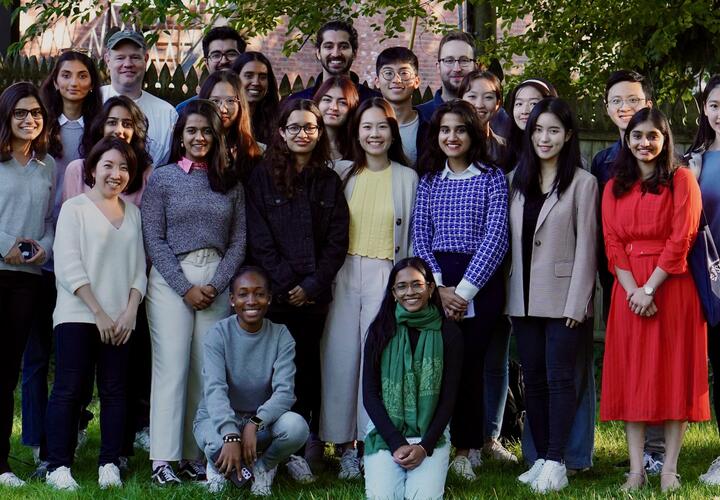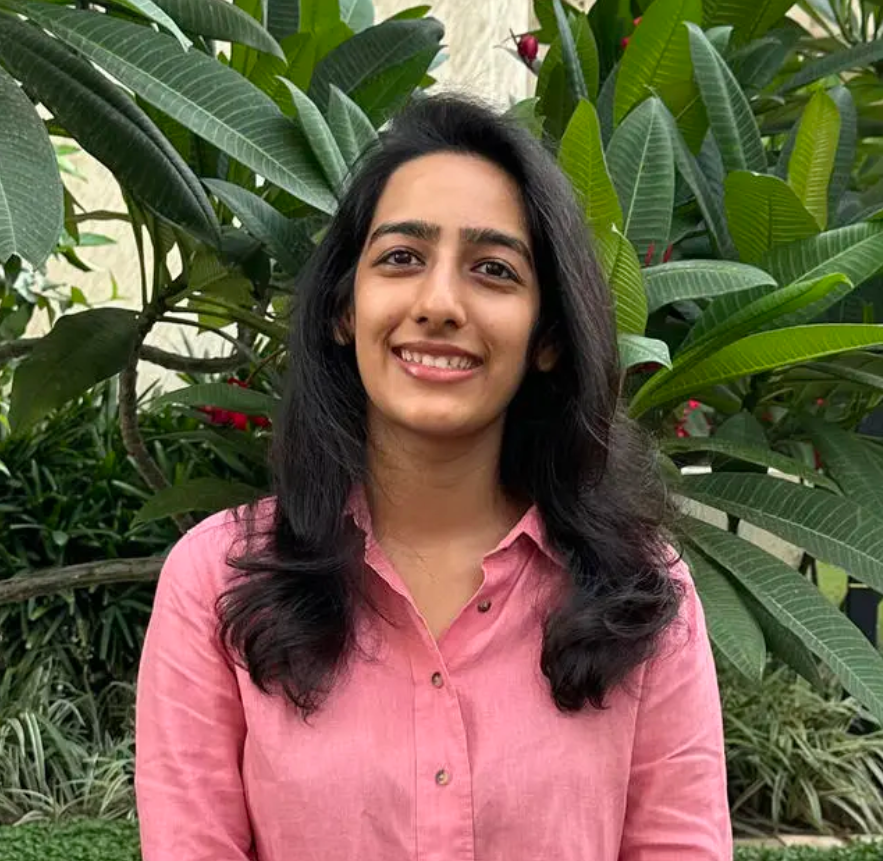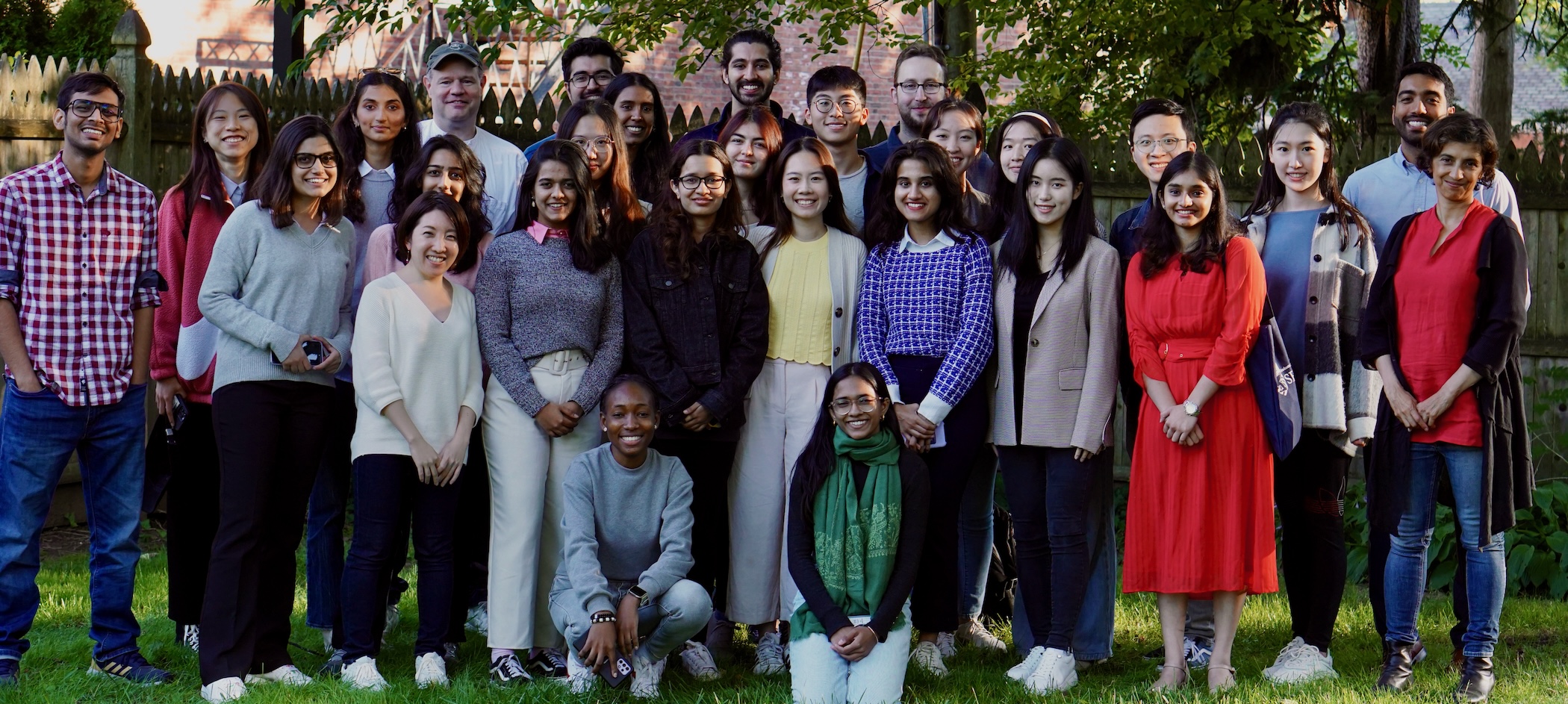Yale’s IDE Program prepares students for a wide variety of careers in International Development
Graduates of the one-year International and Development Economics (IDE) master’s program at Yale describe how it enhanced their skills and expertise through a flexible curriculum that embraces the diversity of careers in international development.

by Adena Spingarn
For Vidhi Maheshwari, who came to Yale University after earning an undergraduate degree in economics in her native India and then working in finance for three years, an elective course on climate change at the School of the Environment gave new focus to her career aspirations. “I came into the program with an idea of wanting to study inequality and poverty, but with the climate change class, I could actually narrow down my research into understanding the unequal consequences of climate change on the developing world.”

Vidhi Maheshwari graduated from the IDE program in 2023 and now serves as an EGC Research Associate.
Maheshwari graduated in 2023 from the Yale International and Development Economics (IDE) one-year master’s program and is now working as a Research Associate at the Yale Economic Growth Center (EGC) through the Tobin Pre-Doctoral Fellows Program. Going forward, she plans to continue working on the global economic impact of climate change.
Understanding the complex forces that shape the global economy requires an evolving arsenal of theoretical, empirical, and econometric tools. During their year in the IDE program, students develop the expertise and skills to operate in the global economic environment from many positions, including research, policy, and nongovernmental organizations.
Most IDE students are international students on F-1 student visas, a status that allows them one year of Optional Practical Training (OPT) visa status for work opportunities not requiring visa sponsorship. For eligible positions, IDE graduates can continue building their skills with two additional years of the STEM extension. These three years of work eligibility after graduation allow IDE graduates to access pre-doctoral and Research Assistant (RA) programs including the Tobin Pre-doctoral Fellows program through which Maheshwari attained her position at EGC.
Established in 1955 and currently housed within the Economic Growth Center and the Department of Economics at Yale, IDE is a one-year master’s program that enhances students’ understanding of economic and econometric theory, policy analysis, and development economics. With its flexible, eight-course curriculum, the program embraces the diversity of careers in international development. It encourages students to use both their coursework and engagement with the varied experiences and interests of their classmates to explore many potential professional paths, including policy analysis, academic research, and private sector opportunities. While some IDE graduates go on to top economics PhD programs, others seek jobs in other fields of international development such as research, policy, finance, and philanthropy.
With their diverse interests and wide-ranging training, IDE alumni form a broad global network of experts in senior positions at the World Bank and senior policy positions in the civil service and ministry arms of several countries. IDE alumni are also faculty at top business schools including MIT Sloan, Berkeley Haas, and Wharton at the University of Pennsylvania, and in the economics departments of prominent universities including the London School of Economics and University College London.
 Photo by Anna Groesser.
Photo by Anna Groesser.
A Q&A with PhD students and Predoctoral Fellows presented for IDE students in 2023.
“The program allows you to specialize in the way you want to specialize,” said 2023 graduate Alex Philip, a Colorado native and Army veteran who is currently working as an RA with an economics professor at Harvard Business School and plans to apply to economics PhD programs in the fall. “A lot of programs are very policy-specific or very theoretical, but I think IDE has a good mix of both, where you can choose for yourself what works.” Like Philip, some IDE students use the skills and expertise they develop during their time in the program to secure a predoctoral research assistantship at a prominent university, which helps them gain admission to a top PhD program in economic, public policy, or a related field. Others move directly to positions in government, think tanks, or the private sector after graduation. Wherever they go, they bring a stronger understanding of the international economic system and of the levers through which inequality and poverty can be effectively addressed.
The foundation of the IDE curriculum is a series of five core classes in which students develop essential competencies in microeconomics, macroeconomics, econometrics, and development economics. Beyond these requirements, IDE students tailor their course of study to their own individual interests by taking graduate-level electives chosen from the broad course offerings available at Yale. IDE students frequently enroll in courses not just in the Graduate School of Arts and Sciences departments and programs, but also at the Yale School of Management, the School of the Environment, the Law School, and the new Jackson School of Global Affairs. These electives strengthen a student’s knowledge and skills for a specific anticipated career trajectory and help them explore their interests among a wide variety of factors influencing global economic development.
IDE students benefit from a small cohort size that allows them to form close personal and intellectual relationships with classmates and faculty, particularly as they conclude the year by writing a master’s thesis. Maheshwari fondly recalls bouncing ideas off her classmates as they wrote their theses. “The entire cohort would have discussions to try and understand whether an idea might work,” she said. “People would come up with ideas on how someone could take [their ideas] forward in a particular direction.” Philip, for his part, remembers spending hours after core classes discussing ideas and questions with faculty and fellow students.
 Photo by Anna Groesser.
Photo by Anna Groesser.
IDE students kayaking during a picnic in East Rock Park, New Haven.
In addition to forming a cohort community, IDE students also connect to a network of experienced professionals and experts in international development who serve as resources as they navigate their career paths. The IDE organizes small informal events with guest speakers, including professors from other universities and senior policy makers from developing countries, many of whom are also IDE alumni. Garima Nain, a 2023 graduate from India now working as a Research Analyst with Innovations for Poverty Action at the World Bank’s Africa Gender Innovation Lab, chose IDE in part because she saw her own professional goals reflected in the career paths of IDE alumni. “Just looking at where the alumni were working after the program,” she said, she knew IDE “would lead straight into the future that I wanted.”
IDE students also have the opportunity to develop their knowledge and skills in paid research assistance positions with Yale economics faculty. During her time in the IDE program, Nain worked as an RA on EGC’s Gender and Growth Gaps project, an experience that was essential to her current job. “Along with my coursework, the RA experience gave me practical insights into how research is conducted in the development space, particularly on gender inequality,” she said. “It also allowed me to cultivate invaluable networks within the development community and enhanced my motivation to drive meaningful change on a global scale.”
During one year of intense but flexible coursework and research experience, IDE students can gain a solid grounding for a wide range of career trajectories in international development – which Nain certainly found to be the case. “When I look at all the different areas that my classmates are in right now, I think IDE offers a really diverse exposure to the job market – be it academia, policy, or even economics consulting,” she said. For students, the IDE program is a unique time to explore and develop skills, interests, ideas, and networks, providing an invaluable steppingstone to rewarding careers in international economics and development.
 Photo by Vestal McIntyre.
Photo by Vestal McIntyre.
IDE students at the Autumn welcome tea in 2022.